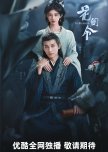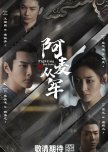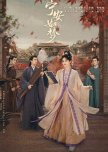
Thief of hearts.
Five Kings of Thieves is a fast paced Republican period wuxia. Zhang Siye puts a mysterious artefact up for auction. This object is said to lead to the whereabouts of the first emperor's mythical cauldron. This draws many opposing interests out of the woodworks; including historic guardians of the treasure, the Five Elements Families. Revolutionary students determined to protect China's national treasures from Japan's Black Dragon Association also jump into the fray.Huo Xiaoxie is just a scrappy orphan and the only treasure he is after is just some nice dim sum to celebrate his shifu's birthday. He sneaks into the Zhang mansion to steal some and bumps into Shui Yao'er, who is after a far more valuable object. They fight into love as they are caught up this high stakes treasure hunt with devastating and life changing consequences. Zheng Zedao a constable with an unknown agenda recognises his resourcefulness and bails him out of a few tight spots. As their enemies encircle them, this thief of hearts races to unlock his own hidden powers to secure the treasure and win the girl.
This is a low budget action packed adventure with many twists that weaves in many brave and colorful jianghu characters with their own side stories. I enjoyed both Ren Min and Darren Chen's slightly exaggerated acting and cute chemistry in this. Its a bit rushed at the end and I could see some of the twists coming early on but still enjoyed watching them play out. The slightly slapstick sequences and the look and feel of this entire production is nostalgic of the old HK TVB Republican era action adventures. Its quite campy and the editing is not the best but with only 12 episodes its a nice, quick watch. My rating 7.0/10.0
Was this review helpful to you?

Switched by the witch.
In Blossom or 花间令/Huā Jiān Lìng (The Flower Order) is a mystery romance with fantasy elements. I checked this out because of Liu Xueyi, an under appreciated actor who is just as good an antagonist as he is a protagonist. Despite some flaws and controversy, this sleeper hit won Liu Xueyi high praise for his good looks and compelling acting.Yang Caiwei is a scarred, inauspicious undertaker shunned by citizens of the sinful city of Heyang. She finds herself embroiled in a murder case with the new magistrate Pan Yue, the most handsome gentleman in the capital. As it turns out, before misfortune befell her family, she was engaged to Pan Yue and he seems determined to honor their betrothal. On their wedding day, she is switched by the witch Shangguan Zhi using dark magic. She finds herself in Shangguan Zhi's body right before "Yang Caiwei" is murdered and suspects Pan Yue of doing the deed! Assuming Shangguan Zhi's identity, she investigates her own murder by working for Pan Yue at the yamen in the hope of finding evidence of his complicity. Body swapping is the only fantasy aspect and it is readily accepted without that much disbelief by the characters in this story.
This production drew early criticism because Zheng Hehuizi guest starred as Yang Caiwei for two episodes and impressed viewers with how she interpreted the role. Her Yang Caiwei is a solemn character; a child whose world was shattered overnight and endured nine years of hardship. She finds meaning in following her shifu's footsteps as a coroner, obtaining justice for victims of foul play. This characterization of Yang Caiwei makes sense to me but unfortunately, there was no meeting of the minds in how the role should be portrayed. Although Ju Jingyi delivers an adequate performance, her depiction lacks depth and gravitas. Her Yang Caiwei is literally only Shangguan Zhi; a happy, pampered young lady who never suffered a day in her life. She is so un-serious as a coroner I just scoffed at her autopsies. Still, she didn't quite ruin the show for me as she is so pretty and charismatic I always have a soft spot for her. I just sigh for the opportunity missed because Yang Caiwei is one of the better written female roles and Liu Xueyi is a fantastic actor to be paired up with. She could have impressed enough with a more layered performance to break her out of her usual typecasting but sadly she did not approach this role thoughtfully enough.
While I watched this for the suspense plot, both romances are nicely written. Liu Xueyi and Ju Jingyi look so gorgeous as a couple that their visuals alone deflect many flaws. To me, Pan Yue’s early obsession with Yang Caiwei was not healthy or well founded but I enjoyed how he fell for her against his better instincts thinking she was the detestable Shangguan Zhi. I never faulted Pan Yue for taking so long to figure out she was Yang Caiwei because both actresses failed to show me of they are the same girl. I like how Zhuo Lanjiang is written to be as capable and powerful in his own way as Pan Yue. He is a credible love rival that does not descend into delusional archetypes. But I wasn't that invested in his romance either.
After the big letdown of Youku's big budget Judge Dee's Mystery, this much more modest production satisfied my craving for a good mystery. The cases, beginning with Yang Caiwei's own murder hooked me from the get go. I enjoyed how each case pulls at threads to reveal links initially to the four major clans of Heyang and ultimately a far wider conspiracy that goes back many years. This familiar formula used in many other investigative series is quite well executed. Despite small plot holes, the focus on the human tragedy aspect of these side cases made me either empathize with the victims or at times even the perpetrators. This is something both Judge Dee's Mystery and Mysterious Lotus Casebook failed to do. The main villain is neither too obvious nor revealed too early, which was my biggest gripe with Mysterious Lotus Casebook. This one does well in keeping us guessing right up till the end. However, this is achieved by concealing information from the viewer instead of hiding all the clues in plain sight.
The narrative hiccups in the final arc back at the capital. It seems like a different writer took over. The villain is revealed shortly after they show up onscreen instead of building suspense for a bit. The final villain is not that smart and only gains an upper hand because two hitherto smart characters are thrown under the bus and exercised their free will in unintelligent ways. It always makes me angry to see good characters get undeserved outcomes so I am not happy with how this ends. Good characters were literally wasted just to squeeze some tears from the audience. Instead of ending on a big reveal, it just descends into melodrama. The chilling ending epilogue however is well done but to avoid spoilers I will elaborate on that below. All things considered, this is still an enjoyable watch. I would have rated it 8.0/10 were it not for the ending. My final rating is 7.5/10.0.
ENDING SPOILER COMMENTS
The ending epilogue is a nice chilling way to end regardless of whether Season 2 gets the go ahead. If there is no Season 2, it suggests that #1 is some kind of arch nemesis of Pan Yue, like Moriarty to Holmes who is still out there; that organizations like The Flower Order are not that easy to wipe out. Note there are actually 9 tokens in total in the end scene.
If there is a Season 2, the mastermind is either someone we already met or someone that has not yet appeared onscreen. Recall #2 only shows up in the final arc so this writer does not play fair with the audience. In that case, it is not useful to speculate further. If however, the mastermind is someone we already met, I think it is most likely Shangguan Lan. It is evident from the plain cyan sleeves that it is a man and while the cloth is rich, there is no elaborate embroidery on the sleeve like the nobles and high officials like Pan Yue and Minister Pan wear. The Shangguan family keeps a private army and they have the vast resources and network to be behind this kind of clandestine organization. They also have links to witch doctors and dark magic, which is how Shangguan Zhi swapped bodies with Yang Caiwei. So it would not be surprising that they worship pagan gods like the ram god. I initially ruled out Shangguan Lan due to his age, but he could have inherited the token from his father.
There is also a possibility the mastermind is a woman because the Chinese title is The Flower Order. In that case, it could either be The Empress or Qingdi, who now pretty much controls Heyang after Pan Yue effectively eliminated all her rivals for her.
X
Was this review helpful to you?

Tale as old as time.
The Legend of Shen Li is a highly entertaining xianxia with a terrific starting hook. Injured while fleeing an unwanted marriage, Shen Li crashes into the mortal realm in her innate phoenix form. Mistaken for a chicken, she is rescued and healed by Xing Yun, a sickly ginseng salesman. Never in my wildest dreams did I think I would be shipping an unseemly attachment between a haughty chicken and a weak but insolent mortal. Their hilarious interactions and witty repartee had me grinning like a fool. This has to be the first CP that I got invested in before the FL properly meets the ML.While I find Legend of Shen Li quite enjoyable, it is a tale as old as time and I am not just making fun of Xingzhi's age. This kind of forbidden love story between a lonely, crusty old god and a much younger one is the staple of this genre. This one is written more as a character story so there is little plot movement until the second half of the drama. The plot itself leans heavily on well known xianxia tropes with a modern, role reversal approach. What makes it special is that it is well executed, the main CP has scorching chemistry, it is anchored by a stellar cast and tongue-in-cheek dialogue has deep and heart tugging undertones. This is an excellent entry-level xianxia that will thrill and delight newcomers to the genre the most. While die hard fans of the genre will certainly enjoy the fresh take on old themes, they may find the plot predictable after the early arcs.
For me, the mortal realm is always the most interesting xianxia arc and this is no exception. It is at the same time the most disappointing arc in terms of missed opportunities. It is too short and half the time Shen Li is an angry CGI bird. Shen Li's feelings for Xing Yun developed so quickly I felt shortchanged on the how and the why she fell in love. Worse, their story is overshadowed by the two utterly heart wrenching ill-fated love stories. To some extent, the narrative coasts on the residual heat from Princess Agents and assumes the audience is already invested in the main CP. The issue is viewers who did not watch that may not feel the chemistry between them. The arc ends so abruptly that it barely dawns upon me that Shen Li's affections could be one-sided. She very high-handedly falls for a helpless mortal and doesn't give him any say in the matter because she knew it to be transitory. This is quite sad and complex and it is a pity the narrative dealt with it too cursorily.
As someone hungering for closure from Princess Agents, I am stoked to report that the chemistry between Lin Gengxin and Zhao Liying burns as hot as ever. This drama is generous to a fault in fusing passionate love scenes with humor and moving romantic moments. I find myself chuckling at how hot and flustered Shen Li gets by Xingzhi's shameless flirting until the veiled pathos behind Xingzhi's careless words hits me and makes me tear up. Both characters are designed to recycle the strengths of their previous collaboration without taking much risks. Notably, there is no extra dimension or complexity to Zhao Liying's role or portrayal. She once again delivers in spades what she does best from the brilliant, combative glitter in her eyes to her signature awesomely bad-ass fight scenes. I would have liked to see more facets to King Bicang beyond the fierce warrior with a deadpan expression who is casually cruel to CGI animals. There is more scope for Lin Gengxin to shine as Xingzhi is a contradiction; the most powerful and yet the most powerless being in the three realms. I was impressed by Lin Gengxin's heart wrenching and nuanced portrayal of this so very alone ancient being who will crack a joke to stop your heart from breaking for him.
As a couple, Shen Li and Xingzhi are too perfect for each other - their world view is largely aligned and besides the one bombastic obstacle of an existential crisis for the realms, there is no real conflict in their relationship. While they experience some acutely angsty moments, they are all short lived. Most of the intense and lingering agony in this xianxia actually comes from the three devastating side love stories. Both characters are fully realised beings that don't grow much. That is left to the likes of Furong who is my favorite character in the first half of the narrative and the character that shows the most growth overall. His limelight in the second half is stolen by Lady Jin who is by far my favorite character and one who saves the draggy second half of the show for me. I find the villains quite boring and archetypal and those roles are also the least well acted. Even though Shen Li and Xingzhi come together in a moving and masterful ending climax, the finale is too much of something I have seen many times before. I did not enjoy the extended ending fight sequences and the heavy handed CGI.
Despite the unoriginal plot, this is an excellent character driven story. I was invested in many characters beyond the leads - Furong, Youlan, Qing Ye, Feng Lai, Mofang, Lady Jin and the indignant Cluck Cluck. The dialogue uses comedy brilliantly as a gateway to the profound in highlighting complex, deep and at times tragic existential themes. I enjoyed the conversation about how if we can work together against evil, we may no longer need gods to be our babysitters. I also felt a shiver of fear in this age of AI at the idea that as creators, one day we will become an existential threat to our creation. Overall a very enjoyable and highly recommended funny and intelligent xianxia that I am happy to rate 8.5/10.0.
Was this review helpful to you?

To Ningdom Come.
Eternal Brotherhood or The Three Heroes of Light/光明三杰/Guāngmíng Sān Jié is the first instalment of the live action adaptation of popular fantasy novel Purple River/紫川/Zǐchuān. The narrative opens in the thick of a gripping battle scene in a complex fantasy world and never stops to explain itself. The world building, political dynamics, power structures and character backstories all have to be pieced from the dialogue. It does not help that the plot is heavy with political intrigue and many opaque Machiavelli characters scheme against one another. Casual viewers out for light entertainment will find this storytelling approach frustrating and confusing.Zichuan is a loose coalition of different warlords, noble families and clans in a war torn continent. Yuanzhou is the battlefront, the critical buffer province that stands between Zichuan and their arch enemy Beizu or the North Clan. Food is the scarcest commodity in that strategic battle-torn province that is rich in resources. Power in Zichuan is divided as the Chieftain Zichuan Canxing of the ruling Zichuan family must answer to the Elders Council. The family's grip on power is underpinned by a sworn brotherhood between the previous Chieftain and two powerful commanders; Yang Minghua who secures the capital and Ge Yingxing who secures Yuanzhou. This alliance frays as Yang Minghua is widely expected to rebel. This is the back drop that Zichuan Xiu, foster son of the late Chieftain returns to after a seven year exile in Yuanzhou. The time is ripe for a changing of the guard as the next generation's three heroes Di Lin, Si Yilin and Zichuan Xiu emerge. There is a subtly ominous foreshadowing as they are clearly parallel characters with their predecessors.
One of the keys to understanding this story is that actions speak louder than words and no one says what they really mean; not even when their interests are aligned. This is clearly conveyed in the secret bathhouse scene; the only safe place in the capital for Di Lin, Si Yilin and Zichuan Xiu to speak freely with one another. Of the brothers, Si Yilin is the most reliable and almost blindly loyal one. Di Lin is also quite easy to understand; a ruthless, vehement and dangerous character who cares for very few people. Zhichuan Xiu is a cunning and complex character that hides behind an indifferent and flippant facade. The first arc (~12 episodes) that introduces the three heroes is strong as they work together to put down a rebellion. It is nice to see Yang Xuwen, Liu Yuning and Zhang Mingen work so well together in their first collaboration. Their rapport and humorous banter lightens the portentous, politics heavy tone of the story.
The second arc explores Zichuan Xiu's relationship with the Chieftain Zichuan Canxing and his niece Zichuan Ning. It is anchored by masterful portrayals of two Machiavelli mirror characters who are not quite yet opponents; warily circling and assessing each other. Yang Xuwen holds his own well in this match up against a veteran like Ma Shaohua. Their dialogue is quietly menacing with doublespeak, layers of hidden meaning and traces of irony, and dark humor. This is a rare drama where I feel real genuine fear that the protagonists may be up against a more powerful and possibly smarter antagonist.
I was so busy wishing Ning to Ningdom Come that it took me a long time to realise she is quite an important character. Not only is she next in-line to be Chieftain but Xiu actually cares deeply for her. This role is not well acted to begin with and made worse by the choice of a terrible voice actor. Consequently Ning comes across as little more than an annoying, childish, spoiled and shallow princess that gets too much airtime. In reality, scheming is in Ning's blood and she has an innate shrewdness and strong survival instincts. She fears Canxing and wears the persona he expects as a silly princess only capable of learning the cartoon version of history and nowhere near ready to assume power to allay his paranoia. In their opening scene together, both Ning and Xiu are role playing the pampered princess and her foolish swain. Unlike Yang Xuwen however, the actress is not able to convey any hidden depth to Ning or that there are layers underneath her words. But if you watch her carefully, she is quite clever in how she helps Ka Dan and Si Yilin and she has a far better grasp of the power structures of Zichuan than she lets on. If they had cast an actress better versed at complex roles, her arc would be more enjoyable and how Xiu grew apart from her would be seen as a sad development rather than a cause for widespread rejoicing.
Considering the limited budget they had to work with, the cinematography, camera angles and overall visuals are really nice and it is quite clear that this drama was made with care. Even though the dialogue is extremely well written, it is too unbalanced and too much plot movement happens via exposition; making battlefront developments hard to follow. The too few action scenes that occur mostly at the beginning and at the end are exciting and very well choreographed. Even the CGI is not heavy handed and is actually really nice.
I find it really difficult to rate this drama at this point because it actually ends in the middle of an arc and is thus unfinished. Even though it ends with a superb line, it does not change the fact that this is not only unfinished but also sloppy enough to not even close the Lei Hong arc. The production's two fatal flaws are not making the world building accessible and in mis-casting Ning. Nonetheless, I really enjoyed this drama and am going to temporarily rate it 8.0/10.0. I will revise up my overall rating for the Zichuan series if the second instalment The King of Light/之光明王/Zhī Guāngmíng Wáng wraps everything up well. I think a strong case can be made to wait to watch this in its entirety when the second instalment airs.
Was this review helpful to you?

Can't judge a book by its cover.
Judge Dee is one of the most widely adapted and iconic ancient Chinese detective figures in popular culture. Di Renjie, or Judge Dee was a prominent Tang Dynasty official and twice chancellor to Empress Wu Tzetian. In the 19th century, Dutch sinologist and diplomat Robert Van Gulik translated an 18th century novel by an anonymous author Dí Gōng Àn/狄公案/Celebrated Cases of Judge Dee, into English. He went on to write numerous other Judge Dee mysteries, increasingly crafting Judge Dee in his own image. Van Gulik's books are regarded as a cultural bridge between East and West. They were devoured by the Chinese diaspora long before Tsui Hark fanned the flames with his wildly popular Detective Dee movies.Judge Dee's Mystery/大唐狄公案 loosely adapts nine cases from Van Gulik's novels for the small screen. This drama has notably high production values with lavish sets and costumes designed to create an immersive visual experience. The cases are well crafted with meticulous attention to detail and pay homage to Judge Dee's reputation as a people's hero; a champion of truth and justice for the common people. The cases highlight the discontent at some of Empress Wu's policies and shortcomings of the Tang Code, China's earliest legal code. Di Renjie gained many insights on the struggles and aspirations of the common citizens as magistrate of many important provinces across the empire. This shaped him into a great statesman and reformer in his later years; a chancellor often known to stand up to the formidable Empress.
This is the kind of drama that I should love - its my favorite genre featuring my favorite Chinese detective, set in my favorite Chinese dynasty and is helmed by a few of my favorite actors. The fight scenes are fantastic and the whole thing just looks gorgeous and bloody expensive. Which just goes to show you, you just can't judge a book by its cover. Because even though there are some really great moments, overall this drama just bored me silly.
The problem with the cases is that the four episode are too long when the villain is usually obvious from the beginning. There is not enough development of the suspects or the victims to make the audience care about the why-did-it. The audience also does not get to participate in the solution. Instead, the intricacies of the how-did-its are revealed as flashbacks in Judge Dee's mind's eye. The cases do get better in the latter half as they tie into Judge Dee's past and are shored up by the appearance of characters like Diao Xiaoguan (Zhang Ruoyun) and Lin Fan (Jiang Yi). Even then, the writing tends to tie the minute details together well while leaving big gaps on important things. Thus it is never fully explained what Diao Xiaoguan's motives were or what terrible thing the young scion of a noble household did that got him disowned and left to fend for himself.
The biggest issue with this drama is that Zhou Yiwei pretty much carries the entire crime-solving team by himself. None of the supporting characters are well designed and there is zero chemistry between Ma Rong, Qiao Tai and Judge Dee. This is made even more obvious when Deng Xiaoguan shows up and there is a tangible difference in the dynamics between everyone. Both of Dee's sidekicks appear and disappear inexplicably in the middle of a case as and when the plot requires. Ma Rong is written to be a comically obnoxious character but there is nothing funny about her obnoxiousness. This is the obvious the weak link in the cast and one that is utterly lacking in charisma that unfortunately gets too much airtime. Inasmuch as Zhou Yiwei and Wang Likun deliver a heart-stopping and mature portrayal of attraction and love at first sight, sadly Cao An is written to be a blank character; an elegant musician well past her youth clinging to a silly girlish fantasy over a highwayman (face palm). She only serves decorative purposes until the final case, where she finally gets to shine with her bravery and her foolishness.
In conclusion, this is a visually stunning production that stays true to its source material in terms of setting and thematic elements. However, despite some exciting and well choreographed action scenes, it fails to deliver truly captivating mysteries and is bogged down by lackluster supporting performances. While the cases in Strange Tales of Tang Dynasty (2022) are only a tad more tightly written, the humor and fantastic crime solving team dynamic elevates that series over this one. That said, Judge Dee's Mystery is not a terrible way to pass some time even though it ultimately falls short of making a lasting impression. I rate this Seasons 1 a 7.5/10.0. Season 2 has been filmed and should air by early 2025.
Was this review helpful to you?

For clown and country.
Fighting For Love is a drama adaptation of a novel with the same Chinese title Ā Mài Cóngjūn/阿麦从军 or A Mai Joins the Army. The novel enjoys an impressive 8.6 score on Douban. It is a female centric story about A Mai, an orphaned noblewoman who seeks justice for her family's betrayal. She joins the army and works her way up to become a fierce and undefeated general. She discovers a greater purpose along the way, which is to defend her country. This takes place during the Northern and Southern dynasties, a period of war, chaos and political turmoil. It is not a romance and there is no real male protagonist; it is about one brave and patriotic woman's awesome journey. I abandoned the book because of its intense and graphic focus on war.Clearly the original story does not fit with the typical male-centric costume drama formula with plenty of romance tropes. What a breath of fresh air, right? Wrong. In the adaptation, Shang Yizhi is elevated to male protagonist and his story arc is as central as A Mai's. Which in and of itself, is not a terrible thing. Like A Mai, Yizhi has a hidden identity and was a victim of foul play. His cause becomes hers as she rescues him and helps him outsmart his enemies. She discovers her military prowess, forms life and death bonds with her troops and finds meaning in defending the citizens of Nanxia. They have a shared purpose and are catalysts for each other's growth. It is natural for attraction or feelings to develop between them though it does not need to be romantic.
The critical fail in the adaptation is they wrote Yizhi as a kind hearted and playful anti-hero character. While some of his comedic scenes are witty and funny, this diminishes him into a parody role. This should be a complex character who does consequential things; a once carefree young nobleman whose world changes overnight. Instead, the writers stuck him with a love brain and Peter Pan syndrome until the final arc. As he is pushed first to survive and then to reclaim his birthright, all of his motivations continue to simply revolve around A'Mai. A character that chooses each time to save the girl and let the world rot does not deserve to end up where he does! This devalues A'Mai and the Zhenbei army's achievements and sacrifices into a fight for clown and country. Even though he becomes morally ambiguous and utilitarian at the end, this evolution is too abrupt. His character progression should have begun well before he returned to the capital. Zhang Haowei did his best with this role but the character is just too poorly designed.
A Mai is quite consistently written throughout even though it is difficult to connect with her feelings for Yizhi. Even though she is too lovely to ever be mistaken for a man, Zhang Tianai does a wonderful job with the role. Her mannerisms are very masculine and she literally shakes with rage and hatred in her scenes with Chen Qi. Best of all, she is no Mary Sue in need of constant rescuing even though all the men fall for her. She just has terrible luck with men; she gets involved with a backstabber, a clown and an enemy with a choking fetish. The one good man she meets is brother-zoned, father-zoned and what happens to him is definitely over-kill. Chen Qi is the most interesting and conflicted antagonist and his and A Mai's story is really sad. Wang Ruichang is very charismatic and the fan favorite but his Chang Yuqing has no development and no real story arc. He just pops up whenever something needs to go wrong for the leads.
The first few arcs of this story are quite good and the cinematography and action scenes are pretty awesome. The story falls apart mid-way and snowballs downhill into the palace arc. It is yet another perfectly good drama that is ruined by ignorant and silly romance writers who can't write palace intrigue (i.e., Destined, Legend of Zhuohua, Wonderland of Love etc etc). This arc is ridden with predictable villains, plot holes, clichés and a flabby dancing emperor who looks like a sloppy fashion mistake. To my surprise, the story comes together again in the final episodes to end fittingly and on a strong note.
It is not easy to rate this because there are many good parts. The first 12-15 episodes and the ending is good and worth ~8 but the middle and dreadful palace arc are only worth ~6+. I think ~7.5 overall is fair but I am only going to call it a 7.0 because the production deserves to be spanked for desecrating a fantastic novel.
Scroll down for SPOILER ending thoughts.
ENDING SPOILER
The final showdown between A Mai and Chen Qi is exciting and moving and it finally gives her closure. Poor Chen Qi is such an interesting, conflicted and ultimately tragic character it is a shame he was not better fleshed out. In the end he probably loved A Mai best.
I don't believe it is in character for A Mai to go off with Chang Yuqing at the end. His feelings for her are not better developed than Yizhi's and at least in the drama, they are one-sided. He is a rising star in Beimo and if A Mai were to marry him, she would have to defect to the enemy to be another caged bird as the wife of a Marquis. After just escaping the terrible fate of being the favorite concubine of an emperor?!? As advisor Xu points out, the countries are at perfect stalemate because their top generals A'Mai and Chang Yuqing don't really want to fight each other. There is peace with them glowering fiercely at each other across the border. A Mai is simply setting off for a well earned 3-year vacation while Beimo's internal palace politics play out. It is a perfect, strong independent woman ending in the spirit of the original novel; one that says A Mai does not have to be someone's arm candy to have a meaningful life.
X
Was this review helpful to you?

A cacophony of crows.
The Story of Minglan is a leisurely and meandering account of how with patience and cunning, Sheng Minglan, the low born daughter of a concubine triumphs over many challenges to achieve both personal and social success. Minglan's father is a middling court official who over indulges his favorite concubine and allows her to turn his household upside down. The petty tyranny of harem rivalry leads to tragedy and Minglan ends up being raised under her grandmother's wing. Minglan's great misfortune has a giant silver lining because this formidable old lady is a force to be reckoned with. She sees to it that Minglan is well schooled and helps her navigate the many pitfalls of harem politics. Minglan blossoms into a quietly underestimated young lady who catches the eye of the most eligible bachelors despite her low status.This drama digs deep into what lurks beneath the genteel façade of Confucian propriety among the status conscious Song dynasty nobility. The deceptively sedate, mundane, humdrum of women living lives of quiet desperation, occasionally broken by shrill outbursts that crescendo horrifyingly in a cacophony of crows. My eardrums barely survived the assault of this panoply of nasty, caterwauling women. The early arcs on Minglan's childhood and coming of age are the best, most empowering ones. The drama climaxes at her vengeance arc, where I found her quiet scheming and utter ruthlessness chilling and impressive. After that the domestic bliss arcs drag on far too long with the couple dealing with repetitive villains with all too similar modus operandi. We really did not need to see version 2.0, 3.0 etc of essentially the same not very smart wicked women archetypes that are too handily dealt with by our power couple.
Zhao Liying delivers a credible portrayal of a docile, Song dynasty noblewoman with hidden depths. The way she digs into you with her eyes, the fleeting cunning smirk and brief flash of fury in her placid gaze foreshadows her evolution into a full-on temper tantrum throwing wife! That said, Zhao Liying is still best at fierce roles rather than as a docile still waters run deep kind of character. Zhao Liying and Feng Shaofeng paint the perfect picture of domestic bliss.Their chemistry is that of a long married couple in harmony and less of the sizzling kind that flared up between her and Lin Gengxin in Princess Agents. It is rare to see Zhu Yilong in a costume drama and I felt real sorry for his Qi Heng who unlike both Gu Tengye and Sheng Minglan, has no free will as he is unable to free himself from the social strictures of his time. The cast overall is very strong with many veteran actors that deliver comical parodies of the ridiculous pretensions of the Song aristocracy.
I am afraid I did not enjoy this very well made drama as much as many other people did. The 70+ episode narrative goes on for too long, conveying an unnecessarily realistic impression of how suffocating it was to be a Song dynasty woman. Considering Gu Tingye's incredibly modern attitudes with respect to polygamy and empowering his wife, I am convinced it was impossible to be a Sheng Minglan in those times. Some of the early arcs are worth 8.5 but the story climaxes too early and is bogged down by repetitive plots in the latter half. This weighs my overall rating down to 8.0. This is a drama that patient viewers with robust eardrums will enjoy more.
Was this review helpful to you?

Frostbite.
The Frozen Surface is a dark and suspenseful northeastern revival mystery thriller. It is set in the desolate, melancholic northeastern suburbs of Harbin, Heilongjiang, a part of China known for its dastardly dry and freezing cold winters. The dialogue is mostly in Northeastern dialect, which I am not familiar with enough to comment on its authenticity. Despite its wild natural beauty, this area is among the slowest growing economic regions in China. The general lack of economic opportunity and the dominance of a largely industrial manufacturing base forms the general remote backdrop for this narrative. The timeline alternates between the 1990s which were very difficult times and 2005, when things are notably better but still a far cry from China's advanced coastal cities.The violent death of a crime boss and two others throws Lanhe County in disarray as various vested interests scramble to position for the fallout. There are almost too many suspects from a jilted lover, mob rivals, the nephew and heir apparent, the ex-wife and an ex-con; all with motive, means and opportunity. Police captain Guan Yu and his team investigates under time pressure to solve this high profile case. The waters are further muddied with an unexpected confession. Very much like 2023's hit The Long Season, the social commentary about the cruel times, hardships the main characters endure and the desperate, heartless and at times tragic choices they make eclipses the mystery itself.
This drama starts out very well but tries to do too many things. What anchors it is fantastic acting by Chen Jianbin (Guan Yu) and Hu Jin (Yang Si). I thoroughly enjoyed their cat and mouse and how a silent empathy developed between them. Even though some characters do bad things, I feel quite sorry for them. There are also a number of absolutely crazy, bloody and scarily violent maniacs in this drama that adds to the growing sense of dread as the plot builds to a climax. Unfortunately, the main villain's origin story isn't empathetic and they made too many bad decisions along the way to qualify as smart. Some plot points are too obvious or are revealed too early. The logic of many characters collapses into the final two episodes and the plot does not tie together tightly at the end. By then, both the director or scriptwriter's brain must have succumbed to frostbite because so many things just don't make sense or are not well explained.
This is a drama that starts slowly but builds up suspense quite well in the first half. The character stories are quite interesting but sad and they are well portrayed by veteran actors. Unfortunately the mystery part crashes at the end. As an avid mystery watcher, I can only rate this a 6.5/10.0. Viewers who are more interested in the setting and the character stories may rate it a bit higher.
Was this review helpful to you?

Hope is not a strategy.
The Hope is the Chinese adaptation of a Japanese manga Dragon Zakura about an unconventional teacher who takes on a class of underachieving students. While I haven't watched the Japanese television version, this Chinese adaptation has clearly been heavily localized even though it retains a manga-like flavor in certain characterizations and comedic sequences. This drama critically examines the Chinese education system and its strong emphasis on the all-important Gāokǎo/高考 nationwide college entrance exam which takes 9 hours over two or three days. In a nation of largely single-child families, nothing is more important than getting their only child into the college of their dreams. With over 10mm taking the Gāokǎo each year, the competition is intense. Even though the pass rate is very high (85-90 percent), a minimum score of 600 (out of 750) is needed to gain acceptance to the most elite universities. Less than 7pct of students are accepted at these top universities and the acceptance rate at Qingbei (Tsinghua University and Peking University) where the crème de la crème matriculate is less than 0.1pct.After a series of entrepreneurial setbacks, star lecturer Lei Ming returns to teaching. He teams up with Sang Xia, a psychology teacher on an experimental program to turn around students that are not living up to their potential. His handpicks five students for his experimental Class 11; an orphan Li Ran, a math whizz Cheng Yushan, an aspiring rapper Jiang Qinglang, gossip girl Bian Xiaoxiao and the browbeaten Yu Yang. With Gāokǎo just a year away, his lofty boast of getting all five of them into Qingbei is widely ridiculed. His biggest skeptics are the students themselves and Sang Xia. His methods though unconventional are hardly trailblazing; much of it involves tried and tested methods used by successful students including time management, minimising distractions, identifying focus areas and being tactical about selecting courses. The drama makes it clear that hope is not a strategy and that while there are smarter, better ways to study, there is just no way around putting in the hours.
This is an exceptional drama that makes a poignant and compassionate case for students who have fallen behind. It exposes how they are failed by an indifferent sink or swim kind of education system. Each of the young actors does a fantastic job portraying their hardships, self-doubt and how they discover their best selves in their struggle against overwhelming odds. I don't have a favorite among them because they all have their own special talents, their own crosses to bear and blossom in their own ways as they learn to take ownership over their own destines rather than just being victims of circumstances they can only change at the margin. Lei Ming and Sang Xia are like fairy god parents who can help but can't make their lives perfect. Rather, they impart upon them the invaluable gift of learning how to cope and the ability to feel compassion for others. This is seen in how the understanding they show poor little rich boy Shen Yao and Lei Ming himself when he lets them down. In saving them, in many ways Lei Ming saves himself.
As for Zhang Ruoyun, he once again shows his uncanny ability to pick fantastic scripts. As always, he leaves so much runway for his young co-stars to shine and lets this story really be about them without defaulting into simply being a plot device. Because his Lei Ming is far from perfect; he is cynical and beneath his confident facade, deeply damaged by his resentment of his father, the great teacher Lei. In helping Class 11 in their struggles with Gāokǎo and their personal devils, he gains perspective on his own journey many years ago and gains some understanding of his father. My heart was in my throat watching Zhang Ruoyun portraying this role so movingly in light of his own difficult relationship with his father. Probably largely due to Zhang Ruoyun's powerful charisma, I found Sang Xia's constant baiting and argumentativeness to be pompous and super annoying initially. But she grew on me and I came to appreciate how their relationship actually thrives on calling each other out and challenging each other to do better.
This drama for all intents and purposes ends at episode 29 and it is fine to just stop there. The episode 30 "twelve years later" epilogue replaces the young actors with older vague lookalikes. That broke my connection with the young actors that I grew to love so much. I didn't mind the sober tone of the epilogue. It delivers the right message that there are no absolutes in life; that even Qingbei is no guarantee that all's well that ends well. The biggest lesson learned, the one that stands the test of time beyond all the academics is about coping with life's ups and downs. And they are still young enough that the whole world still lies ahead of them so their journey continues. My biggest issue with it is I had hoped for better for Lei Ming. But I guess that is what makes this drama so special; this ability of to be so incredibly inspiring yet so unbearably realistic at the same time. If you wish to skip the realism, then call it a day at episode 29. It still falls short of a fairytale but at least there is an abundance of hope.
This is a highly recommended and very memorable watch that I enthusiastically rate 8.5/10.0.
Was this review helpful to you?

An Oriental Odyssey.
Chu Sijing, a captain of theJinyiwei/锦衣卫 or Embroidered Guard is on a mission to investigate a strange epidemic that broke out on the remote Wumu Island in Liaodong province. The outbreak threatens the adjacent NInghai Fortress, a critical stronghold against the invading Jurchens. The powers that be have their own agendas and appear more interested in covering up the outbreak than anything else. Thus Sijing steals onto the island aided only by a Mongol Tartar official Bo Yan and a Fulangji/佛郎机 businesswoman Angelica. There he encounters mysterious, disease afflicted villagers who worship ancient Gods and is forced to deal with some monstrous truths. Can he weed out the root of the epidemic before it overwhelms them all?This story is set in the 3rd year of Tianqi, when the Ming Dynasty was in rapid decline. It was a time of many natural disasters from meteorites to a mini ice age, drought and famine. Superstition reigned high as the peasants were starving and the emperor was widely said to have lost the Mandate of Heaven. The drama invests heavily in world building and weaves in many themes from the period and fantastical creatures from Chinese mythology 山海经/Classics of Mountains and Seas and 神异经 / Classics of Gods and Spirits. Even though the CGI is not the best, I appreciate the effort that went into how they blended history, fantasy and ancient lore together to make this an Oriental odyssey.
Unfortunately all the research and creativity that went into world building is wasted on the story's plot which hints heavily at a complexity that never materialises. For such a short drama, there are too many subplots touching on many themes that go nowhere. Even ignoring Sandrine Pinna's appalling Disney cartoon character acting, the entire Angelica/Pirates of the Caribbean arc adds nothing to the story. The time would be better spent fleshing out the motives of the Henggong cult and tying up the many loose ends to the story. I usually like Huang Xuan's acting and enjoyed his chemistry with Bo Yan but this is not his best role. Maybe it is the overuse of green screens but I caught him frequently out of the moment and staring blankly into space. Shen Rang is the only character that really moved me and I enjoyed this character design and portrayal the most.
The best things about this drama are that it does try to be different, it is short, some of the action scenes are pretty good and it is oddly enjoyable despite its lack of logical consistency. The ending is anti-climatic, doesn't hang together well, leaves loose ends and is disappointing overall. I am being generous in rating this as a 7.0/10.0.
Was this review helpful to you?

To the ends of the earth.
The Lonely Warrior is a crime thriller about one man's obstinate, obsessive thirteen year quest for justice. It is a highly dramatized account of a real life case. The movie version Endless Journey is led by Zhang Yi whereas this drama version is led by Qin Hao.In the middle of a tense, emotional criminal case, an interrogation accident ends the careers of the elite Third Brigade investigative unit led by Cheng Bing. After a ten year stint in prison that costs Cheng Bing everything, he emerges hell bent on hunting down the violent killer Wang Dayong who eluded them all those years ago. He reunites with his squad, all of whom have at surface moved on with their lives but are still haunted by this cold case. They initially go to great lengths to help Cheng Bing but as a result of life commitments end up dropping out. Cheng Bing soldiers on deliberately, methodically pursing the vicious Wang Dayong seemingly till the ends of the earth, leaving no stone unturned.
The strongest aspect of this drama are the chase scenes and the way tension builds in a gripping and chillingly suspenseful way. What I didn't like was how Wang Dayong barely appears in the latter episodes. It was done to raise doubt over whether Cheng Bing was doggedly on the right track but it also made me quite frustrated with his obduracy. They failed to capitalise on Chen Minghao who delivers an incredibly menacing, ruthless and unpredictable Wang Dayong, a hardened criminal with exceptional survival instincts. I was also dismayed with what they did to his appearance; effectively obscuring all the nuances of his expressions. This would have been a lot better if they focused more in the cat-and-mouse chase between Cheng Bing and Wang Dayong with heart stopping near misses instead of pushing Wang Dayong off-screen for such long stretches.
My biggest issue with the narrative is that it delves too deeply into Cheng Bing's and the Third Brigade's personal stories. Qin Hao never fails to impresses in how he conveys deep emotions and he really out did himself in making us feel the weight of everything he loss. But I was not convinced at all by his relationship with Miao Miao. This is not a necessary character even though Ren Min does a good job with it. Add Tong Tong to the mix and I was just rolling my eyes. Even though I enjoyed the Third Brigade's camaraderie, they should either have had them see the case through all the way with Cheng Bing or not at all. It is very annoying to watch the narrative build up all of their personal stories only to see them drop out half way through. The most relevant and interesting relationship is the contentious one between Pan Dahai and Cheng Bing. These many digressions come at the cost of losing the momentum of the chase. This would be a much tighter and better drama with fewer episodes. As such, I am not surprised that the movie version has been better received than the drama even though I personally think the drama has a better lead cast.
Despite some pacing issues, this is overall a very enjoyable suspense thriller anchored by a stellar cast. Happy to rate it 7.5/10.0.
Was this review helpful to you?

Drink the finest wines, look at lovely girls, make the best friends, and fight glorious battles.
Spymaster Ning Yuanzhou and his elite Liudao Tang spies are tasked to escort a Wu diplomatic delegation to An to pay a king's ransom for their captured ruler. He encounters the stunning and deadly Ren Ruyi, a vengeance driven assassin nonpareil who defected from An. They have overlapping goals and form a wary alliance. Predictably, these aging-out, disillusioned operatives from opposite sides fall in love and indulge in a mid-life crisis amidst a suicide mission to rescue the foolish Wudi. This is an unexpectedly funny drama and the humor works well but masks the monumental task ahead of the delegation. Its best achievement is it makes us fall in love with a motley crew of unforgettable, flawed characters to the point we root for them against all odds and beyond reason.This is a rare drama where I am more invested in the supporting cast than the main leads. Written by a feminist writer, Ren Ruyi is literally superwoman; independent, ruthless and indomitable; an indestructible one woman killing machine with fantasy level combat abilities. Ning Yuanzhou also walks on water; a master spy whose machinations decide who sits on the thrones of both states. Together they are so formidable that it seems more efficient to skip the mission or war as they can easily topple any ruler in their way. These over the top character designs with exaggerated abilities and superficial flaws rarely resonate with me. But I did derive petty enjoyment from their bitch slapping, scolding and kicking ass through the two kingdoms.
The casting of Liu Yuning and Liu Shishi in the leading roles is brilliant. While there are better actors, these roles play to their individual strengths and they both executed well. Liu Yuning plays a character that hides in plain sight. A too pretty actor would not work in this role. And Ren Ruyi the stone cold killer is perfectly reflected in Liu Shishi's stoic expressionless face and bright hard eyes. Even as she becomes less guarded and warms up to the delegation, there is bare of relaxation of her taut features; every frown and smile is controlled. Her head is at an exhausting elevated angle that made me wonder if she has frozen shoulder. Even her grief is so beautiful in a restrained way that I was unaffected, even mildly irritated at her cry scenes. Such an aloof portrayal made their chemistry seem decent but did not light up the screen . So it didn't matter to me if they made it out at the other end. As fully realized characters that live and die by the sword, they know the score. Their romance peaks too early, had few true obstacles and repetitive fan service sweet nothings moments . The heavy handed messaging about women's biological clocks annoyed me.
The more interesting characters are the young ones, Yang Ying and Li Tongguang, both on heroes journeys. He Landou delivers a inspiring portrayal of an uncertain young princess completely in over her head, overcoming fear, heartbreak and every obstacle to emerge as a purposeful person with the the courage of her convictions. At surface Li Tongguang appears to be a fascinating character; strong, smart, ambitious and charming. Unfortunately he has a dark side, an odd and creepy Oedipus complex for his shifu. Part of the problem is this narrative doesn't invest in villains; most antagonists are killed off so quickly they leave no impression. Thus Li Tongguang becomes the default fall guy; whenever something bad has to happen to create angst or move the plot along, it is pinned on him. Nonetheless the role is well played enough that I had a soft spot for the character throughout.
Saving the best for last, Fang Yilun's Yu Shisan stole the show as far as I am concerned. I love flawed, humorously self-aware, very mortal characters like this with no special powers or death defying abilities. Hopefully Fang Yilun's amazing comedic expression and timing gets noticed. His shock and aghast at the idea he was falling in love made me shake with laughter and moved me unaccountably at the same time. When he prosaically warns his love not to fall for a rogue like him, I knew she was as much a lost cause as I was. Shisan is the unsung hero of this story. He picks up the slack so that Yuanzhou can rescue Ruyi and was there for Qian Zhou, Sun Lang and Yuan Lu through the last legs of their mission. He remained true to his life's mantra to live fully with no regrets: drink the finest wine, look at lovely girls, make the best friends, and fight glorious battles. / 这辈子就要喝最烈的酒, 看最美的姑娘, 交最好的朋友, 打最漂亮的仗. It is too bad he did not dare to or did not believe he had the right to love and thus denies his heart to finish the job. If I could have changed just one thing, I would have had Shisan leap on to that horse along with his love. The other flawed character I enjoyed immensely is Wudi. After Shisan, he made me laugh hardest, especially during the great escape. He also moved me with his profound regret and intent do better.
This drama has a linear plot that is not well paced; it either advances at a high speed that glosses over logic holes or stalls out to dwell on repetitive romantic or delusional tropes. The harder you look at the plot, the less it makes sense. As it is more of a character story, I am willing to be forgiving as long as important characters are not destroyed along the way. In that aspect, the drama starts out exceptionally well with a fantastic core of well conceived, multi-layered and compelling characters. Unfortunately, the character designs start to break down quite early on, with Li Tongguang. The ending was rushed, had some sloppy edits and packs in an unnecessary Wu arc. Too many characters are destroyed into the finale including Ruyi and Yuanhou. Ruyi prioritizes her personal agenda, bites off more than she can chew (again) and had to be rescued (again); forcing Yuanzhou to choose his love over his mission. Consequently they were not there when Liudao Tang needed them most. Finally, Ruyi makes a decision that is not true to herself or to her beliefs about living well. After investing so much on Li Tongguang, this character has no development and mucks everything up in the finale. The ending was was bloodier than I expected and unnecessarily cruel. I didn't have a huge issue with the outcome in and of itself, just the figurative character assassinations.
As for the ending scene, upon re-watch, I realized it is not confusing, it simply pays homage to the meaning of the drama's title Yī Niàn Guān Shān / 一念关山 or A Thought of Guanshan and closes the drama on a note of finality. It is a line from an ancient poem 却东西门行/But the East West Gate written by Shen Yue during the Northern and Southern dynasties. It is a sad poem reflecting on life, the passage of time and destiny. Guanshan/ 关山 refers to memories spanning the mountains and rivers (meaning the far reaches of the empire); of past events joyful and sorrowful. It is an Auld Lang Syne moment where someone who lived on longs for the bygone years and lost friends. It is unnecessarily cruel to close the story with a character that was meant to move on with their life. The bigger point is everyone they are thinking of did not make it out at the other end. The ending to me is not ambiguous.
I enjoyed many parts of this drama which started out as an 8.5 for me but there were draggy parts, key characters got destroyed, all the holes become obvious with re-watch and the ending is just not good. It is still a wonderful watch with lovable characters, fabulous fight scenes and divine comedy. I am just petty and I won't forgive them for Yu Shisan. My final rating is 8/10.
ENDING SPOILER COMMENTS
The final scene is actually very clear.:
Ten years later, the countries are at peace. He County which was the frontier battleground is prosperous and thriving; children are well schooled but the naughty ones sneak out to play. Chu Yue visits the battleground which with a decade of peace is covered with grass. She takes a moment to think of the past, of everyone that sacrificed and imagines either what could have been or that they are in another place. Her fantasy doesn't have to make complete sense because it is just her imagination. The child she sees on the horse is not the same younger child that sneaks out of school. Ning Shisan on the horse is older, with loose hair in a pure white outfit. Chu Yue should not be in this scene. Shisan denied his heart to set her free. He saved her and meant for her to go on, to love and live life with no regrets. It enraged me that they did this to poor Chu Yue and it would have broke Shisan to see her like this.
Ruyi should have been in that end scene, possibly with a son and a daughter. She could have escaped and remained true to her promise to Yuanzhou to go on without him, that a woman can live well without love. The drama foreshadowed many times that she would be last woman standing and yet they both literally and figuratively killed her character when she chose to blow herself up after assassinating the Beipan king and prince. Ruyi had a choice and the one she made sends all kinds of wrong messages to women everywhere. The only woman who remained true to herself was Yang Ying. She moved on, made the best of her situation and lived well regardless. If Ruyi had to die, the end scene should have closed with Yang Ying instead of Chu Yue.
I also think they should not have killed off Wudi. The team put themselves in harms way to bring him back; he learned some hard lessons and would have been a much a better ruler for it. They killed him off so that Yuanzhou could play kingmaker. It was a rushed, completely dumb, ridiculous and gratuitous Wu subplot that negates poor Qian Zhou and Chai Ming's sacrifice. I could go on but these are some of the main reasons I am so let down by the ending.
Was this review helpful to you?

Only the good die young.
The second instalment of Sima Yi's story opens with his uncomfortable return to the capital to serve under the most unworthy Cao Rui, the ingrate he saved as a boy and put on the throne. Cao Rui grew up to be a monster and what he did to Empress Gao was a great historical injustice. The symbolism of Cao Rui being carried by Sima Yi is strong, suggesting their dynasty was held up by Sima Yi and most of this drama makes the case that the treacherous Cao family was unworthy and deserved to be toppled. I usually like Liu Han but did not enjoy how he portrayed Cao Rui. I was unmoved by his childhood trauma over being the product of an indifferent father who executed his mother and just drummed my fingers impatiently through his theatrics and unseemly antics with his vile eunuch. I did appreciate some aspects of his acting - he seemed cunning and slightly unhinged in the most dangerous of ways that made me feel fear for the Sima family.The highlight of the second season is without doubt Sima Yi's rivalry with Zhuge Liang, the greatest strategist of Three Kingdoms lore. It was heart wrenching to see two soulmates with such profound mutual understanding, respect and admiration locked in a ferocious life and death battle. Both bound by oathes they swore to dead emperors, one is handicapped by a strong master and the other by a weak one. It was just war brutal and simple; there was no right, or wrong, or good or evil; just opposite sides. The writer does a commendable job making the sophisticated military strategies exciting and accessible to viewers. This version of Zhuge Liang's famous Empty City Ruse/Kōngchéngjì/ 空城计 suggests Sima Yi was not really fooled, he just had a very strong sense of self preservation. Their encounters capture the essence of a resting dragon/wò lóng/ 卧龙 reclaiming the central plains from a hidden tiger 冢虎 (zhǒng hǔ), a rising talent. Alas, time was not on Zhuge Liang's side or history may have been different. Nonetheless, his trick from the grave on Wuzhang Plains left no doubt in peoples minds that " a dead Zhuge scares away a living Zhongda". It is remarkable that till this day, Zhuge Liang is the most revered strategist of Three Kingdoms lore and it remains almost a footnote in history that Sima Yi actually "won" Three Kingdoms. This arc broke my heart; I couldn't bear how Sima Yi exhausted Zhuge Liang and how unworthy both their emperors were.
The narrative inevitably peaks at the Zhuge Liang arc; their battles were the pinnacle of Sima Yi's accomplishments. After that, the drama really dragged. It wasn't necessary to dive into so much detail into the Cao Shuang arc. We really didn't need another long and boring example of what imbeciles Cao Cao's descendants turned out to be. The arc was incredibly predictable with repetitive ploys to try to indict the much older Sima Yi only to see him deftly turn the tables on his enemies yet again. The only highlight of that arc was the wild speculation around Sima Zhao's role in the death of Sima Shi's wife's death but that sub-plot didn't get wrapped up in a satisfying way. The only thing that kept me watching was Tan Jianci and Xiao Shunyao's excellent portrayals of the Sima brothers. I also found it quite cool that they cast an actress to play the treacherous and effeminate He Yan.
After the Zhuge Liang arc, it struck me that even though I was fascinated by Sima Yi and often empathised with him, I just didn't liked him. I was not surprised that he became darker in his later years; this is foreshadowed from the beginning and was an insidious process throughout. The second half of this drama seemed to go on for an eternity. That ruthless, cowardly, cunning, wicked old tortoise Sima Yi just would not die! It offends my sense of justice that he lived to such a ripe old age. I guess it must be true that only the good die young.
This drama had at least 10-12 episodes too many. We really didn't need such a detailed the blow by blow of Sima Yi's much less interesting later years. Up to the Zhuge Liang arc, I rate this 8.0/8.5 but after that it's a 6.0/7.0 so overall this a 7.5 for me.
Was this review helpful to you?

How a leader of men becomes a follower of a woman.
Li Ni is too good to be true: a brave, patriotic, upstanding and brilliant young general who safeguards the border at the kingdom's farthest reaches with his Zhenxi army. He aspires to live a carefree, adventurous life at his beloved Laolan Pass with his found family of merry men, steering clear of his imperial roots. And no wonder; his royal father and two half-brothers are cowardly, venal, ambitious, duplicitous and so dumb they test the limits of the word. But destiny intervenes when a military governor Sun Jing seizes the capital, holds Li Ni's witless father hostage and the imperial grandson and rightful successor goes missing. As the kingdom descends into civil war, Li Ni leads the intrepid Zhenxi army to try to save the day. He encounters the bold and audacious A Ying, a lieutenant at the helm of the formidable Cui family army. At first glance, A'Ying is an awesome character; strong, independent, daring, ambitious and cunning. While they have different visions of the future, they are aligned in the immediate purpose of defeating Sun Jing. They join hands in an alliance that has each trying to out do the other in terms of being the one to seize victory. Sparks fly between them, suggesting a broader and more permanent union could be in the cards.The political plot is very loosely based on the history of the founding of the Tang dynasty. The writing reflects a shallow understanding of politics and historical reality and just plain laziness. The writer clearly didn't know what to do with the one interesting and smart villain and thus quickly kills them off. We are then bamboozled with a bunch of very tired one-note villain archetypes who are surprisingly difficult to kill dead despite their limited brain cells. They are so done before too many times villains that they are not worthy of mention. The only good thing about the battle for the throne arcs are the action scenes; they are exciting and bloody. Xu Kai always delivers incredibly agile and powerful fight scenes and with a good action director like this, he really shines. The drama peaks at an epic and consequential battle around episode 32 and that is probably the best place to stop. It took me a long time to get through the final 8 episodes that were unnecessary and as bland as tofu.
In terms of the romance, this drama is anchored by good chemistry and flawless portrayals by Xu Kai and Jing Tian. It errs on the side of being overly generous with the fan service sweet scenes, which I only mildly enjoyed. I may have been more convinced had I not just come off watchingJing Tian beam beatifically up at Feng Shaofeng (Legend of Zhuohua) with that exact same limpid, adoring expressions. The bigger issue is that A Ying as a character is incredibly difficult to like. She is strong willed, reckless and has a most unbecoming need to win all the time and especially when she is wrong. She doesn't even "win" with any great, glorious or brilliant schemes; her kisses are essentially Kryptonite as far as Li Ni is concerned. It is beyond infantile that he would cede an entire city for a kiss! Li Ni's wants are mallaeble as far as she is concerned and she takes it upon herself to meddle in high power politics to achieve the outcomes she wants. When she doesn't like the consequences of her schemes, it is inevitably Li Ni's fault. The "dealbreaker" conflict between them never gets solved; their relationship is bailed out by events, which is an anti-climatic writing cop out that left me convinced they will surely end up divorced. She does not communicate with Li Ni, overestimates her ability to handle problems on her own and is oblivious to the fact that a deranged lunatic is after her even though he captures her many times. To my dismay, each of her near death experiences are just near. We are told this is a smart and independent character but we are shown she is not smart and constantly needs rescuing from her own hubris. Their love story is an utterly soul destroying tale of how a leader of men becomes a follower of a woman. The only love story in this drama that actually moved me was that of Consort Xiao.
This is Xu Kai's best recent drama after a string of disappointments and he does a really good job here playing a character with massive hero complex. As for Jing Tian, I didn't love her character but I am sure a less charming actress would have frustrated me into dropping this. Despite the good acting, the many logic holes, pedestrian sub-plots and cardboard characters make for a smooth but bland cocktail. I can only rate it 7.0. Overall it is not a bad watch for the fantastic fight scenes and squeal-worthy flirty moments.
Was this review helpful to you?

May the baddest man win.
This is the drama adaptation of a popular female harem web novel "Kun Ning" (坤宁) by Shi Jing (时镜) with an interesting approach; readers voted on who the female protagonist ends up with. It is a dark and gripping tale of intrigue, conceit, betrayal, revenge and redemption. Jiang Xuening is the alluring but resentful, selfish and ambitious daughter of a court official who ruthlessly parleys her charm and cunning into becoming empress. Her schemes lead to the downfall of the royal family and the ruin of both her childhood sweetheart Yan Lin and the erstwhile incorruptible Zhang Zhe. Desperate and full of regret, she barters her life with the blackbellied Xie Wei to save Zhang Zhe. She finds herself reborn as her 18-year old self with a chance for a do-over. She vows to do better this time, to steer clear of the bastions of power and the malevolent Xie Wei. She tries to use her preternatural knowledge to save Yan Lin and Zhang Zhe from their sad fortune. As she embarks on a journey of atonement, she discovers there is an element of destiny that pulls her towards the center of power. This time, with greater wisdom and insight, she uncovers hidden secrets and unexpected allies that help her better grasp the intrigue unfolding around her. Is that enough to change their destinies or are they doomed to the same tragic fate?This story explores the causal links between the past, the present and the future.; the idea that if only knowing what we know now, we can go back and do what we should have, could have but did not do. It begins with a Ning'er who is already a fully realised character that is not yet revealed; a charming beauty who had the world at her feet and lived a wicked and self-indulgent life. Even though Ning'er's goals change, her innate nature stays the same. The past is told in flashbacks just before the moment plays out again in the present. This works in terms of the more detailed plot points but dilutes the character and relationship stories. Thus while Bai Lu pulls off her role well overall, the piecemeal telling of the backstory doesn't capture the depth of Ning'er's regret or the layers in her relationships with some of the main characters.
Where the storytelling falls short is in Zhang Zhe's arc. To me, it is the most pivotal love story in the drama. He was the best of men, a morally upright official who betrayed his principles for her. And she was a selfish person who was so moved she became selfless for him. Their emotions were so powerful it pushed them both outside of themselves towards a mutually destructive outcome. Sadly unlike the novel, their do-over relationship is shallow and barely scratches the surface of the unfinished affinity between them. It's a pity that instead sticking to the novel which better fleshes out this arc they wasted a bunch of time on the nasty Consort Shu's boring and tropey petty antics. Wang Xingyue delivers such an empathetic portrayal of Zhang Zhe that I was disappointed his character was short changed by the narrative.
As for Xie Wei, I have a weakness for unapologetic, unspeakably damaged, vengeful and morally ambiguous characters like this. Zhang Linghe delivers an intense portrayal of this dark and complex role. Although he overdoes some of the snarls and sneers, his performance overall deserves praise and is his strongest to date. Every time the full fury of Xie Wei's fiery death glare flashes across the screen, I go weak at the knees and my brain turns to mush. Yups, I am definitely a "may the baddest man win" kind of girl. Xie Wei is far from the best man but they are well matched, morally flexible ends justify means kind of people. Their romance arc only takes off later on but it is worth the wait. A mutual understanding develops gradually between them before things get really hot and steamy. When it does, their audacious chemistry explodes in a way that sets a new bar for passionate kiss scenes going forward.
Even though the political conspiracy is not that complicated, it is well told and riveting. Xie Wei's origins are a bit too obvious early on but I enjoyed how Ning'er and Xie Wei work together to uncover the conspiracy. They are both diabolical in how they manipulate the different factions around like chess pieces. The villains are no pushovers but they are overshadowed by the force of nature that is Xie Wei and Ningér's combined dark ruthlessness. This is not an action heavy drama but all of the fight scenes were well shot. I particularly enjoyed the vicious ferocity and absolute glee with which Yan Lin cuts through a melee. I hope this fight maniac Zhou Junwei's small indiscretion does not stand in the way of future roles in action intensive wuxias. Outside of one unnecessary and infuriatingly gratuitous death, the drama ends on a strong note after a bloody, intense and thrilling showdown.
While I enjoyed this drama immensely, the storytelling left me vaguely dissatisfied; as if I only watched the cliff note version of a story that had a lot more depth, nuance and substance than the drama managed to convey. This director is not great at knowing which plot arcs to give more weight to and has an unfortunate predilection for over-bright spot lights and spinning cameras. The production values are mediocre at best. This is a story that had so much potential it deserved to be in the hands of a better director and a better budget. I still rate this a highly reccomended 8.5/10.0.
Was this review helpful to you?


 23
23 112
112 7
7















